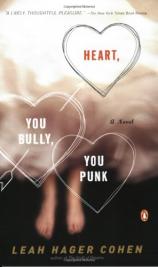Reading Group Guide
Discussion Questions
Heart, You Bully, You Punk

1. Regarding Ann's mysterious fall from the gym bleachers, the narrator says, "It was like all those times you're looking out over the edge of a balcony thinking, 'What if I can't fight the urge to jump?' and of course you never do jump, some little primitive, vestigial switch inside your body prevents you from ever doing so—only last Friday hers malfunctioned. But, oh, it was exhilarating." Compare this to Esker's many reflections on New York University's library, and the ways in which its design tempted her to jump. Do you think that the author is using the choice to jump or not to jump as a metaphor for a core difference in the way Ann and Esker perceive life and its risks?
2. Consider one of Esker's true passions, geometry, and how it presents itself in the designs and patterns that surround us every day. How does the author use this throughout the novel? Apply this, for instance, to the architecture of the spaces that they occupy at home and at work. How does Esker's apartment offer the reader further insight into her character? What about Wally and Ann's home, as well as the resturaunt Game? Do the spaces influence them or are they influenced by the spaces?
3. Did the teenagers depicted in the novel seem to be more sophisticated than their age? If so, how and why? Do you think we underestimate the nuances of life that teenagers are able to detect and digest? Or, do you think Ann James and her propensity for "falling" is a consequence of leaving an adolescent to her own devices in an emotionally complicated situation?
4. Discuss Wally's restaurant. How does author use it at as symbol and metaphor? What do you think Alice's intentions were when she bought that business for her husband?
5. Why do you think Alice and Wally didn't pursue a divorce? How did Alice make you feel? What did she have that Esker lacked, and vice versa?
6. In your estimation, is Esker in love with Wally? If so, compare the outcome of their relationship to that of her and Albert's. How do you account for the manner in which Esker exits the emergency room at the end of the novel?
7. After Ann's initial fall from the bleachers, Wally says that her confinement to the sofa forced an intimacy between the two. Did you see evidence of that in their relationship?
8. How do the blue casts benefit Ann? Why does she cry when the doctor removes them?
9. Is Ann mentally ill? Are there passages in the novel that imply this?
10. Discuss Albert's ghost. Is he really gone at the end of the novel, or is Esker's reluctance to get involved with Wally an indication that she hasn't let go? Do all of the characters have ghosts? If so, elaborate. Are their certain characters that have ghostly qualities?
11. In the end, is Esker "bullied" out of a relationship with Wally by her heart, or is it an indication that she's taking control of her life? Do you believe that the author has left room in the story for Esker to choose to be with Wally sometime in the future?
Heart, You Bully, You Punk
- Publication Date: April 27, 2004
- Paperback: 224 pages
- Publisher: Penguin (Non-Classics)
- ISBN-10: 0142004324
- ISBN-13: 9780142004326







